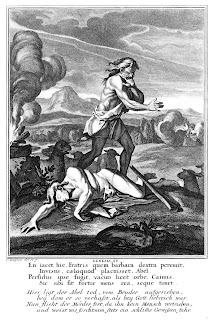Genesis 4:1-16 – A Tale of Two Brothers*
I encourage you to read Genesis 4:1-16 along with your reading of this blog. Find the NRSV translation of this passage here!
Adam and Eve have been driven from the Garden as a consequence of their rebellion. They are now wanderers on the earth and in our story for today we see a ripple effect which engulfs the descendents of Adam and Eve. The story of the brothers Cain and Abel is a story of rejection, jealousy, envy, murder and alienation. But it is also a story of grace, for in the end, even as Cain must bear the consequence of his rash act, God does not abandon him. In fact, God promises to be accompany him even to the land of Nod, which is truly at the edge of the earth. There is no place too far or too distant for God; there is no place too remote for God’s presence; there is no sin which will lead God to completely abandon us.
It is easy to be distracted in this story by details that are not explained in the text. Why does God choose Abel’s thank-offering over Cain’s? There is nothing in the text to suggest that there was anything wrong with Cain’s. Commentators through the years, including notably John Calvin, have invented all kinds of reasons why Cain’s offering was not acceptable. But the fact is - this is not explained in the Genesis text. We can only conclude that this is not an important point for the storyteller. It is also important to recognize that this inequity mirrors the inequities we experience in our own lives. Why are some born with certain skills and others not; why do the innocent suffer? Life can be unfair. This is the state of life after the fall. There is no explanation, only a promise: God is present with us no matter what.
Also, other questions we can get sidetracked by: Where did Cain’s wife come from? And where did the people of Nod with whom Cain settles come from? The text does not answer these questions either. We need to accept the text as it is and not invent reasons, and also not dwell on these secondary issues, lest we miss the point of the story.
And what is the point of this story? Working backwards I have mentioned one of the important points above – God is present with us in our wanderings no matter what. The other main point of the story centers around Cain’s famous question to God: Am I my brother’s keeper? The answer is – Yes! We do have a responsibility for God’s wonderful creation, including and especially our brothers and sisters. As long as we are in enmity with others we will never experience God’s Shalom (peace). Shalom is a triangle: Brother*/Brother*/God! Our calling is then to be open to the needs of others and to be willing to reach out of ourselves to give of ourselves for others. The promise is God’s presence and that in so doing God will grant to us an experience of Shalom/Peace. This vision of Shalom is beautifully described in our Psalm for today: Psalm #133: How very good and pleasant it is when brothers live together in unity! It is like the precious oil on the head, running down upon the beard, on the beard of Aaron, running down over the collar of his robes. It is like the dew of Hermon, which falls on the mountains of Zion. For there the Lord ordained his blessing, life for evermore.
* Please note – the word “brothers” is interchangeable with “sisters.”
Bibliography - "Genesis - Translation and Commentary" by Robert Alter. This is a wonderful translation. This is the translation I am using at Peace.
Also see Walter Bruggemann's Interpretation commentary on Genesis; Bill Moyer's conversations about Genesis and Gary Rendsburg's lectures on Genesis (available through "The Teaching Company")
Also - this very interesting article: Mozart & Salieri, Cain & Abel - A Cinematic Transformation of Genesis 4
This work is by Caspar Luiken, 1672-1708


Comments
Post a Comment